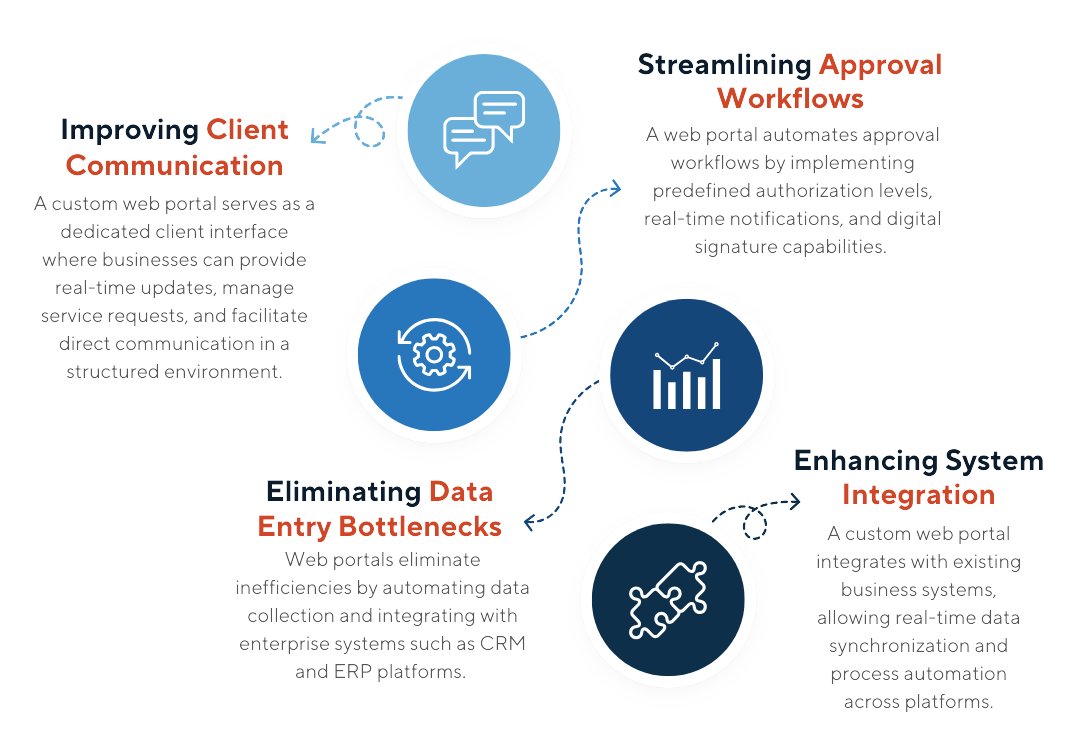Efficiency is critical for B2B companies navigating complex workflows, managing multiple stakeholders, and meeting customer expectations. Yet, many businesses continue to rely on outdated systems, manual processes, and disconnected tools that create inefficiencies and hinder growth.
Common challenges such as disjointed client communication, slow approval workflows, data entry bottlenecks, and poor system integration make it difficult to scale operations effectively.
Why B2B Organizations Need Web Portal Development
As companies expand, managing operations across multiple teams and locations becomes increasingly challenging. Many businesses still rely on email threads, spreadsheets, and disconnected applications to handle critical processes. This lack of cohesion leads to inefficiencies, errors, and delays that impact productivity and profitability.
A well-designed web portal consolidates essential business functions into a single, secure platform. Whether it’s managing customer interactions, automating workflows, or integrating enterprise systems, a custom web portal provides real-time access to data and process automation capabilities. With better visibility and streamlined operations, businesses can respond faster to client needs, improve decision-making, and reduce time spent on administrative tasks.
Solving Common B2B Challenges with Web Portals
B2B organizations face operational hurdles that slow down efficiency and impact service delivery. A well-designed web portal addresses these challenges by centralizing processes, improving collaboration, and automating key workflows.
Improving Client Communication
One of the biggest challenges businesses face is disjointed client communication. Without a centralized system, teams often struggle to keep track of client inquiries, service requests, and project updates. Information gets lost in long email chains, leading to miscommunication and delays in service delivery.
A custom web portal serves as a dedicated client interface where businesses can provide real-time updates, manage service requests, and facilitate direct communication in a structured environment. By reducing reliance on email and improving transparency, web portals help businesses enhance client relationships and response times.
Streamlining Approval Workflows
Approval processes can be another major bottleneck, particularly when they rely on manual signatures or long email chains. Invoices, purchase orders, and project approvals often get delayed when key decision-makers are unavailable, causing disruptions in business operations.
A web portal automates approval workflows by implementing predefined authorization levels, real-time notifications, and digital signature capabilities. This reduces turnaround times, enhances accountability, and ensures that approvals move forward without unnecessary delays.
Eliminating Data Entry Bottlenecks
Data entry inefficiencies pose a significant challenge for many organizations, particularly those still relying on manual input. Entering customer information, updating records, and processing transactions by hand not only consumes valuable time but also increases the risk of human error.
Web portals eliminate these inefficiencies by automating data collection and integrating with enterprise systems such as CRM and ERP platforms. This ensures accuracy, prevents duplicate entries, and improves overall data consistency.
Enhancing System Integration
Poor system integration remains a common pain point for businesses that rely on multiple software applications. Many organizations operate a mix of legacy systems, cloud-based tools, and third-party applications, making it difficult to achieve a seamless flow of information.
A custom web portal integrates with existing business systems, allowing real-time data synchronization and process automation across platforms. Instead of manually transferring information between different software solutions, businesses can create a unified digital ecosystem where data flows freely, improving operational efficiency and reducing administrative workload.

How Custom Web Portals Drive Business Growth
A well-implemented web portal delivers measurable business benefits beyond process optimization. One of the most significant advantages is the improved customer experience. When clients can access project updates, submit requests, and communicate through a secure online portal, they receive faster service and a more convenient experience. This level of accessibility builds trust, enhances customer satisfaction, and helps businesses establish long-term client relationships.
The Future of B2B Operations with Web Portals
As businesses continue to adopt digital transformation strategies, custom web portals will play an essential role in streamlining operations, reducing costs, and enhancing customer engagement. Organizations that invest in portal development services gain a competitive edge by improving internal efficiency and creating a seamless digital experience for clients and partners.
Partner with Marcel Digital for Custom Web Portal Development
Marcel Digital specializes in developing tailored web portals that align with business goals and drive operational efficiency. Our expertise in web portal development services ensures that businesses receive scalable, user-friendly solutions that integrate seamlessly with existing enterprise systems.
If your business is ready to optimize operations with a custom web portal, contact Marcel Digital today to explore how we can help modernize your digital infrastructure.
Ready to start your project?
Let's chat. Fill out our form, and our team will be in touch with you shortly.
Web Development
About the author
Alex Vilmur
Alex Vilmur is a wizard at development and also trumpet. He once auditioned for The Mighty Mighty Bosstones, but found his passion for website development and Umbraco made it too hard to leave.